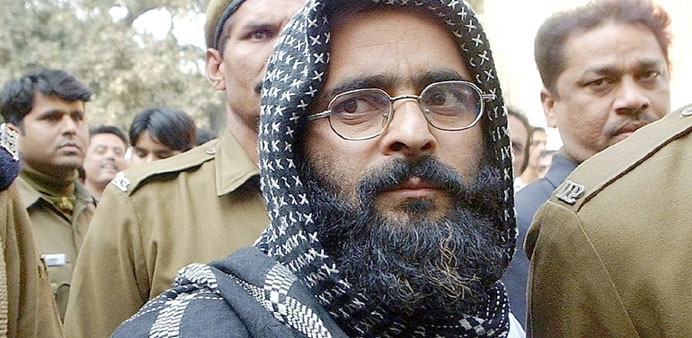In this file photograph dated December 16, 2002, police escort Afzal Guru to a court in New Delhi.
Agencies/New Delhi
India hanged a Kashmiri militant yesterday for an attack on the country’s parliament in 2001, sparking clashes in Kashmir between hundreds of protesters and police who wielded batons and fired teargas to disperse the crowds.
President Pranab Mukherjee rejected a mercy petition from Mohamed Afzal Guru and he was hanged at 8am in Tihar jail in New Delhi. Security forces anticipating unrest had imposed a curfew in parts of Jammu and Kashmir and ordered people off the streets.
“Afzal Guru was hanged at 8am. All legal procedures were followed,” Home Minister Sushilkumar Shinde told reporters.
India blamed the 2001 attack on the parliament of the world’s largest democracy on militants backed by Pakistan, targeting the prime minister, home minister and legislators in one of the country’s worst ever militant attacks.
Pakistan denied any involvement and condemned the attack but tension rose sharply and brought the nuclear-armed neighbours dangerously close to their fourth war. Nearly a million soldiers were mobilised on both sides of the border and fears of war only dissipated months later, in June 2002.
The hanging was ordered less than three months after India executed Ajmal Kasab, the lone surviving gunman of the 2008 attack in Mumbai in which 166 people were killed.
Yesterday’s execution could help the ruling Congress Party deflect opposition criticism of being soft on militancy, as it gears up for a series of state elections this year and a general election due by 2014, while grappling with an economic slowdown.
“Congress has decided to be more proactive in view of the elections, not only in terms of economic policy but also matters like the hanging of Afzal Guru,” said political analyst Amulya Ganguli.
“The Congress has now deprived the BJP of a propaganda plank,” he said, referring to the main opposition Bharatiya Janata Party.
Supreme Court advocate Kamini Jaiswal told CNN-IBN television that the execution was driven by the government’s desire to appear tough on militancy with 2014 polls looming and said Guru’s conviction was based just “on circumstantial evidence.”
Government officials dismissed suggestions that electoral politics played a role in the decision to execute Guru.
The BJP welcomed the execution, but one of Guru’s co-accused who was later cleared said it was a travesty of justice and the New York-based Human Rights Watch described it as “inhumane.”
The BJP said the “world could see India is committed (to) the fight against terror.”
But the hanging drew bitter criticism from Kashmir where leading separatist leader Mirwaiz Umar Farooq announced a four-day shutdown of the scenic region in protest.
“This execution will definitely strengthen our resolve and add a new chapter to the freedom struggle,” said Farooq, chief priest at Kashmir’s main mosque.
Guru, who had insisted he was innocent and said he wanted to see his teenage son grow up, had been “framed”, Farooq added.
Farooq and another leading separatist leader Syed Ali Shah Geelani were taken into preventive custody, a form of detention used frequently by Indian authorities to maintain law and order.
One of Guru’s co-accused, S A R Geelani, a college teacher, who was also sentenced to death but later cleared, said Guru never received a fair trial.
He added that Guru’s family were not informed he had been executed but the government said they had been notified by express mail.
A group of lawyers who had campaigned for Guru’s release said he had been found guilty on the basis of “fabricated evidence” and was denied proper legal representation in court.
Guru’s family said they were asking authorities to be allowed to perform his last rites inside the prison and also to be given the body.
“We have written a letter to the deputy commissioner of Baramulla district demanding Afzal’s body,” his cousin, Yasin Guru, said.
The man from Doabgah village near Kashmir Valley’s Sopore town had known since Friday evening that he was to be hanged. He was woken up at 5am yesterday and he offered his prayers before calmly approaching the noose, officials in Tihar Jail said.
He was buried quietly soon after, close to the cell he had spent so many years in solitary confinement. The Supreme Court had sentenced him to death in 2004.
In major towns of Kashmir, where security forces have battled a separatist insurgency for decades, barricades were erected and hundreds of police and paramilitary force members were deployed.
“The hanging of Afzal Guru is a declaration of war by India,” said Hilal Ahmad War, leader of a separatist faction.
Authorities shut down Internet services and blocked social networking sites to try to stop unrest from spreading. Jammu and Kashmir Chief Minister Omar Abdullah made a televised appeal for calm.
Scuffles also broke out in New Delhi between Hindu activists and demonstrators who gathered at a city-centre protest site to condemn the hanging.
Five militants stormed the heavily guarded parliament complex in New Delhi on December 13, 2001, armed with grenades, guns and explosives, but security forces killed them before they could enter the main chamber. Ten other people, most of them security officers, were killed in the clash.
Guru, 43, an Indian national, was convicted for helping organise arms for the attackers and a place for them to stay. He had denied any involvement in the conspiracy.
India said the Pakistan-based Jaish-e-Mohamed militant group was responsible. The group fights Indian rule in Muslim-majority Kashmir.
The hanging last year of Kasab, after a long lull in executions, prompted speculation that India would move quickly to execute Guru.
But unlike Kasab’s execution, which sparked celebrations in the streets, Guru’s case was seen as more divisive.
Some Kashmiri leaders warned that hanging Afzal would fuel the revolt in the northern state in which tens of thousands of people have been killed since 1989.
Curfews were imposed in Srinagar, the state’s summer capital, and major towns including Baramulla, Guru’s hometown.

